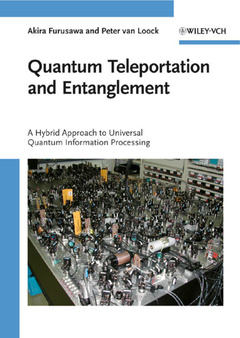Quantum teleportation and entanglement - a hybrid approach to optical quantum information processing A Hybrid Approach to Optical Quantum Information Processing
Auteurs : Furusawa Akira, van Loock Peter

Part One Introductions and Basics.
1 Introduction to Quantum Information Processing.
1.1 Why Quantum Information?
1.2 States and Observables.
1.3 Unitaries.
1.4 Non-unitaries.
1.5 Entanglement.
1.6 Quantum Teleportation.
1.7 Quantum Communication.
1.8 Quantum Computation.
1.9 Quantum Error Correction.
1.10 Experiment: Non-optical Implementations.
2 Introduction to Optical Quantum Information Processing.
2.1 Why Optics?
2.2 Quantum Optical States and Encodings.
2.3 Quantum Optical Unitaries.
2.4 Gaussian Unitaries.
2.5 Quantum Optical Non-unitaries.
2.6 Gaussian Non-unitaries.
2.7 Linear Optics: Possibilities and Impossibilities.
2.8 Optical Quantum Computation.
Part Two Fundamental Resources and Protocols.
3 Entanglement.
3.1 Qubit Entanglement.
3.2 Qumode Entanglement.
4 Quantum Teleportation.
4.1 Qubit Quantum Teleportation.
4.2 Qumode Quantum Teleportation.
5 Quantum Error Correction.
5.1 The Nine-Qubit Code.
5.2 The Nine-Qumode Code.
5.3 Experiment: Quantum Error Correction.
5.4 Entanglement Distillation.
5.5 Experiment: Entanglement Distillation.
Part Three Measurement-Based and Hybrid Approaches.
6 Quantum Teleportation of Gates.
6.1 Teleporting Qubit Gates.
6.2 Teleporting Qumode Gates.
7 Cluster-Based Quantum Information Processing.
7.1 Qubits.
7.2 Qumodes.
8 Hybrid Quantum Information Processing.
8.1 How to Create Non-Gaussian States, Cat States.
8.2 Experiment: Creation of Non-Gaussian States, Cat States.
8.3 Hybrid Entanglement.
8.4 Hybrid Quantum Teleportation.
8.5 Hybrid Quantum Computing.
References.
Index.
Peter van Loock received his Diploma in physics from the University of Erlangen-Nuernberg, Germany in 1997, and his PhD degree from the University of Wales, UK in 2002. His research is on theoretical quantum optics and quantum information, in particular, on optical protocols for quantum information processing. He is a member of the German Physical Society.
Date de parution : 05-2011
Ouvrage de 352 p.
17.5x24.9 cm
Disponible chez l'éditeur (délai d'approvisionnement : 12 jours).
Prix indicatif 144,39 €
Ajouter au panier


